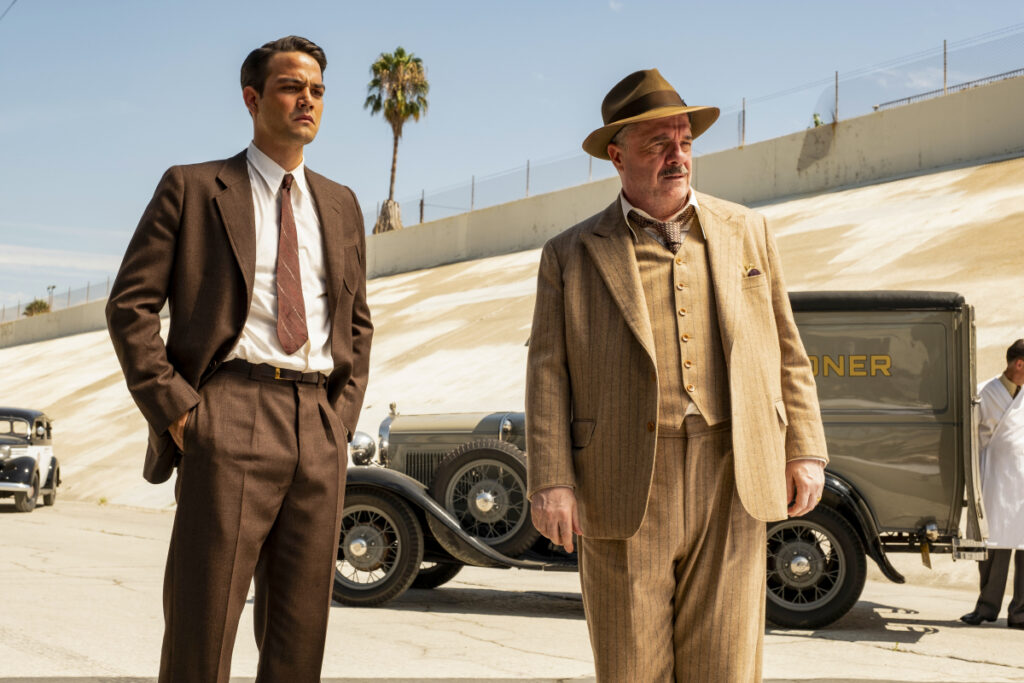Fans of the Showtime cult hit “Penny Dreadful” may be a little surprised by the new show that bears its name. Where’s Eva Green? Where’s Timothy Dalton? Why aren’t we in Victorian London anymore? And where are the monsters?!?! Leave all of that at the door because this is an unusual spin-off, something more akin to what “American Horror Story” does every year than what fans may expecting from Showtime. After all, the title “Penny Dreadful” referred to a type of British fiction, so a new series with the same kind of lurid theatricality from the same creator (John Logan) could theoretically work with a very different setting and narrative. I say “theoretically” because “Penny Dreadful: City of Angels” just doesn’t quite come together over its first four episodes, displaying some of the B-movie dread of the other series, but feeling surprisingly tame for a show about racial strife, Nazis, and supernatural beings. I kept waiting for “City of Angels” to truly jolt to life, to scare me or surprise me. Other than a few fun scenes and a scene-stealing performance from Natalie Dormer, it’s just too inconsistent and flat overall to connect as anything but a footnote to the first series for now.
It is 1938 Los Angeles, an era rich with storytelling avenues to travel. Not only is World War II looming on the other side of the world, but violence is finding its foothold in the City of Angels. At times, this feels like James Ellroy’s L.A., a place where innocents like the Black Dahlia would be butchered under the neon lights of Hollywood. It opens with L.A.’s first Mexican-American detective Tiago Vega (Daniel Zovatto) being drawn into a disturbing case involving murders that invoke Mexican imagery and seem designed to heighten tension between cultures in a city that’s increasingly divided. Vega’s partner is a Joe Friday type named Lewis Michener (Nathan Lane), and his mother Maria (Adriana Barraza) happens to have a close relationship with Santa Muerte (Lorenza Izzo) herself.

Supernatural dynamics flirt on the edge of “Penny Dreadful: City of Angels,” but they’re centered in the character of Magda, played by Dormer, a shape-shifter who plays multiple characters across L.A., fueling unrest and division. She plays an abused mother who draws close to a German pediatrician (Rory Kinnear) who happens to be a member of the Nazi party in one scene and a Lady Macbeth type to a city councilman (Michael Gladis) who is trying to rise the political ladder. Magda is the most interesting thing about “City of Angels,” and not just because Dormer is allowed to have some fun in a relatively boring show. Magda is an agent of chaos, someone lighting matches across a city washed in lighter fluid.
What does it all add up to? I’m not sure yet, and “City of Angels” isn’t stylish enough to just be a hang-out show so far. It’s surprisingly flat visually, other than a few stand-out scenes like a dance number in a Mexican club with Dormer in episode three. In that moment, the show becomes something strange and different, embracing its oddity in ways that it just doesn’t often enough.
Part of the problem is that the cast isn’t equally up to the challenge of such a theatrical oddity that plays with multiple genres. Zovatto looks totally lost, as if he’s purposefully playing flat and affectless to match noir protagonists of the past but just comes off boring. A relationship with him and the great Kerry Bishé just doesn’t work. Lane is solid, but the show suffers from something that sometimes haunted the original in that Green was such a presence on that program that it suffered when she was gone—that’s even more of an issue here re Dormer, who sometimes looked like she walked off a much more interesting, daring program than the rest of the cast. Maybe they’ll catch up to her before the end of the first season.
Four episodes screened for review.












